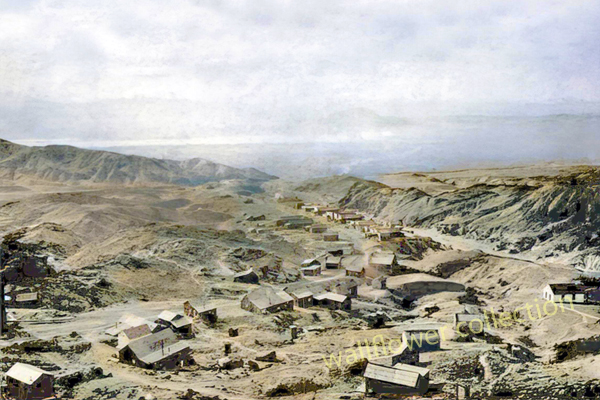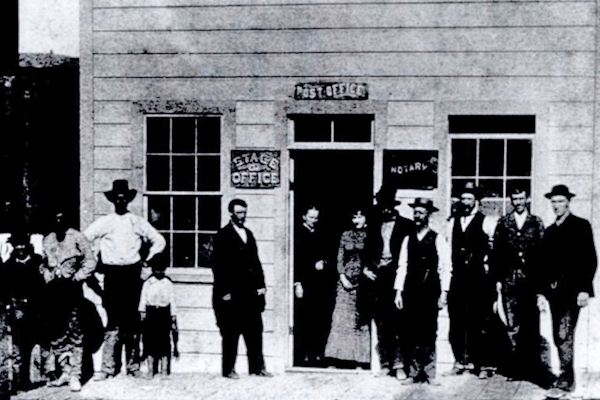The Camp

Calico 1884
A SETTLEMENT GREW UP on a mesa-like ridge at the foot of Wall Street Canyon. Most of the businesses flanked a single, twisting street.
Calico experienced little growth at first. The townsite contained not one building on July 4, and Wall Street Canyon contained only a cabin. Only two men lived in the district. Not until Sam James, a few days later, started work on the Silver King Mine did the district experience much activity. As the summer of 1881 ended Sheriff J.C. King leased the mine; the ore assayed $100 to $2,000 a ton. Within weeks, prospectors were swarming over the region, as a Los Angeles daily reported: ". . . Notices and monuments are plentiful everywhere, and the number of locations made in all parts of the district are innumerable, it appearing that parties have located everything that has any appearance or resemblance of a ledge, waiting to see what the future may bring forth. . . . Prospecting parties are branching out in all directions, north, south, east and west, prospecting in every range that can be reached," limited only by their ability to bring their own water. Meanwhile, Calico's business district had come to encompass three stores, a hay yard, and an assay office. Town lots were going for "reasonable prices." Ten men were working at the Silver King for $4 a day. Mrs. Hieronymous Hartman, the camp's first woman, arrived to open a boardinghouse. ". . . Wall Street booming. No banks yet," quipped one correspondent.
Promising strikes were made all through the fall and winter of 1881, but life remained dull. Residents watched for "capitalists, and waiting (like Micawber) for something to turn up. . . ." The camp was so quiet that the sighting of a mountain lion [!] became the excuse for a hunt. As the holidays approached, Hartman began "agitating the question of a grand Christmas dinner; but as the turkey and chickens have not put in an appearance there seems to be a poor showing for anything better than the regular beans and bacon. . . ." Since mail was "rather irregular," stage driver Aaron Harrison offered to bring mail for anyone on his weekly trips from San Bernardino, "so we will, hereafter, be able to get news from the 'inside' at least semi-occasionally." ("Inside" referred to such areas as San Bernardino and Los Angeles.)
The lack of a railroad, gales, and record snowstorms that blocked most travel from San Bernardino failed to daunt the pioneers. After all, seven or eight men were working at the Burning Moscow Mine, lumber was on hand to put up several buildings, and the camp now supported a blacksmith shop, three stores, all said to be "doing a very good business," Barber's assay office, a good lodging house and a "good boarding house" kept by Mrs. Hartman, who was "prepared to give a good meal at all times," and even a shooting gallery. Above camp, the "Silver King boys have them a very comfortable house."
As 1881 turned into 1882, the press knew there was "no danger of the excitement at Calico dying out." Sheriff King called upon the editor of the San Bernardino Index, "beaming with smiles and having more rocks in his pocket than usual." And a Captain Covington left the editor "two very fine specimens" of silver ore. ". . . We esteem the Captain . . . and wish him all sort [?] of good luck . . . --he deserves every bit of it."
The wretched weather continued through January (1882). But employment at the King had risen to 10. "Judging from the number of boxes of miners' candles unloading" at a store in San Bernardino, the Index concluded that "there must be a good deal of underground work going on in our mines."

Calico post office
But the isolation could still make the district's residents anxious. The Southern Pacific Railroad began building an extension from Mojave Station to Needles, on the Colorado River, in February. Yet mail for Calico was still being delivered along a roundabout route of several hundred miles, through Rogers Station and Ivanpah. One correspondent fumed that letters "are generally a month old when we get them; yet they pass within two miles of camp but are securely locked in the mail sack. We have the most populous camp on the desert, yet can't get a Post office, and some of the boys indulge in cuss words when they find their mail worn out in traveling back and forth in sight of camp. . . ."
Other problems plagued the district. Because of the camp's remoteness, the cost of freighting was high--$25 a ton from San Bernardino--and the mines were still not producing ore. Part of the cost of freighting could be attributed to the lack of natural resources. The Calico region supported little game, little of the land could be cultivated, and the weather underwent "unpleasant extremes." As for fuel, the greasewood (creosote) and cottonwoods along the Mojave River were sparse. The river was so low in March that it yielded only "steam." The veteran miner S.D. Blade concluded that nothing could "live on these plains without hauling grub, except land turtles or lizards or an occasional jack rabbit. . . ."